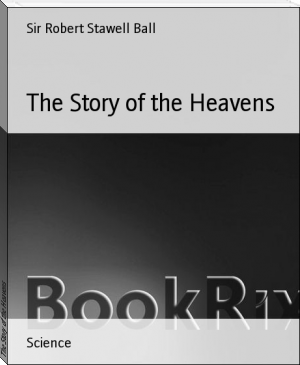The Story of the Heavens - Sir Robert Stawell Ball (ebook reader for laptop .TXT) 📗

- Author: Sir Robert Stawell Ball
Book online «The Story of the Heavens - Sir Robert Stawell Ball (ebook reader for laptop .TXT) 📗». Author Sir Robert Stawell Ball
tube 20 feet long, the telescope will therefore have moved the ten-thousandth part of 20 feet--_i.e._, the fortieth of an inch.
[43] _See_ Newcomb's "Popular Astronomy," p. 508, where the discovery of this law is attributed to Mr. J. Homer Lane, of Washington. The contraction theory is due to Helmholtz.
[44] The theory of Tidal Evolution sketched in this chapter is mainly due to the researches of Professor G.H. Darwin, F.R.S.
[45] The hour varies with the locality: it would be 11.49 at Calais; at Liverpool, 11.23; at Swansea Bay, 5.56, etc.
[46] Having decided upon the units of mass, of angle, and of distance which we intend to use for measuring these quantities, then any mass, or angle, or distance is expressed by a certain definite number. Thus if we take the mass of the earth as the unit of mass, the angle through which it moves in a second as the unit of angle, and its distance from the sun as the unit of distance, we shall find that the similar quantities for Jupiter are expressed by the numbers 316, 0.0843, and 5.2 respectively. Hence its orbital moment of momentum is 316 x 0.0843 x (5.2) squared.
Imprint
[43] _See_ Newcomb's "Popular Astronomy," p. 508, where the discovery of this law is attributed to Mr. J. Homer Lane, of Washington. The contraction theory is due to Helmholtz.
[44] The theory of Tidal Evolution sketched in this chapter is mainly due to the researches of Professor G.H. Darwin, F.R.S.
[45] The hour varies with the locality: it would be 11.49 at Calais; at Liverpool, 11.23; at Swansea Bay, 5.56, etc.
[46] Having decided upon the units of mass, of angle, and of distance which we intend to use for measuring these quantities, then any mass, or angle, or distance is expressed by a certain definite number. Thus if we take the mass of the earth as the unit of mass, the angle through which it moves in a second as the unit of angle, and its distance from the sun as the unit of distance, we shall find that the similar quantities for Jupiter are expressed by the numbers 316, 0.0843, and 5.2 respectively. Hence its orbital moment of momentum is 316 x 0.0843 x (5.2) squared.
Imprint
Publication Date: 07-14-2010
All Rights Reserved
Free e-book «The Story of the Heavens - Sir Robert Stawell Ball (ebook reader for laptop .TXT) 📗» - read online now
Similar e-books:





Comments (0)